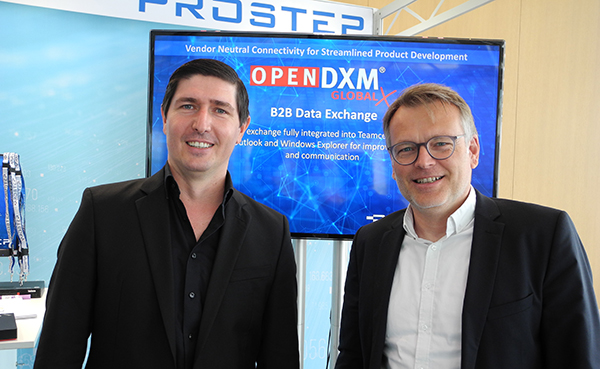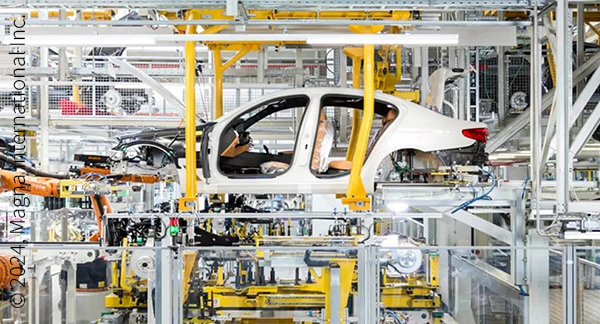
|
Contract manufacturer Magna Steyr automates data export and import in Teamcenter with OpenDXM GlobalXBy Udo Hering Data exchange requirements are becoming increasingly stringent – not only in terms of technology and regulations but also in terms of data security. Transfer processes like OFTP, which have proven their worth in Europe, are still relatively unknown in Asia. Magna in Graz therefore uses the web-based platform OpenDXM GlobalX from PROSTEP for global data exchange. 
With just under 180,000 employees and revenues of almost 43 billion US dollars (2023 financial year), the international automotive supplier Magna International develops technologies, systems and concepts for improving mobility. Magna's strength in Graz lies in the development and manufacture of complete vehicles. For years, Magna's entire vehicle group used PROSTEP's time-tested data exchange solution OpenDXM to exchange data with customers and suppliers, usually in combination with the Odette File Transfer Protocol (OFTP). As these standard procedures are not widely used in Asia, the engineers initially exchanged data with Asian customers and their suppliers via e-mail, says Oliver Burlon, System Administrator Data Exchange. The files are now too big to be sent via e-mail and customer security requirements have also become more stringent, meaning that certain formats can no longer be sent via e-mail. This meant that they had to come up with a new solution that makes data securely and quickly and records the process. Technological leap to OpenDXM GlobalX At the end of 2018, Magna replaced the OpenDXM installation in Graz with OpenDXM GlobalX in order to accommodate the growing number of customers and projects in Asia and make it possible to use web technology. "We realized that we needed a technological leap if we wanted to continue to offer secure global data exchange," says Burlon. "And we've been preparing this technological leap together with PROSTEP for a long time." There was no need to select a new system as OpenDXM GlobalX met all the requirements for secure data exchange. However, the company is taking advantage of the switch in system to set up new data exchange processes and eliminate a number of weak points that previously made it difficult to automatically analyze the data and make it available. As Burlon points out, the collaboration with PROSTEP worked very well. "We came up with good ideas and PROSTEP implemented them in appropriate solutions, taking advantage of the new possibilities." OpenDXM GlobalX at Magna in Graz is integrated seamlessly in the PLM solution Teamcenter, which the company uses to manage its product data. This means that engineers can send their components and assemblies directly from their familiar working environment or make them available for downloading. As Burlon explains, the components and assemblies are generated using the CAD systems CATIA V5 and NX, with users working in the customer systems if the project so requires; or the constellation is the other way around with customers accessing the Magna environment directly. 
More than just a CAD data exchange tool The contract manufacturer makes the CAD data available to its exchange partners in either native formats or in the neutral STEP format, depending on whether or not the recipients have appropriate CAD licenses. Teamcenter also offers the option of converting CATIA and NX data into the JT format and distributing it via the data exchange solution. This option is primarily used by internal departments, e.g. for visualization purposes or automated geometry checks. OpenDXM GlobalX is no longer merely a tool for exchanging CAD data, it is also used to quickly exchange confidential data of any kind with partners. This could, for example, be the data used to prepare requests for quotation, which the purchasing department makes available to suppliers for a certain period of time. The buyers use the integration in Windows Explorer and effortlessly save their quotes in the folders for the partners in question using copy and paste. OpenDXM GlobalX offers the option of creating recipients on an ad hoc basis. This is, however, currently only being used by colleagues in France, for whom the data exchange team has defined special methods. The data exchange platform at Magna in Graz is installed with a central server that all exchange partners have to log onto and a FileVault that is used to make the encrypted data available. In order to reduce latency when transferring data to Asia Pacific, a local FileVault, which is connected to the European FileVault using dedicated lines, has also been set up there. This is also where Asian customers and their suppliers can retrieve and also upload data. This has the added advantage that fewer problems with the "great Chinese firewall" are encountered, says Burlon. A similar solution for American partners is currently being developed. The architecture of the solution makes it possible for partners in Asia to exchange data in a fully decentralized manner and without synchronizing it with the central installation in Graz. This allows them to use OpenDXM GlobalX as their central data exchange platform. As an alternative to decentralized FileVaults, thought was also given to using OpenDXM GlobalX as a SaaS solution. However, in view of the huge amounts of data that would have to be constantly uploaded to and downloaded from the cloud, the data exchange team decided against it, says Burlon. "In Europe, using the cloud is a question of cost, whereas in Asia it is primarily a question of security." 
Data volume of 190 terabytes in a single year A total of approximately 7,000 external partners have been set up in OpenDXM GlobalX. These are not companies but rather individuals; around 5,000 employees use the data exchange solution internally. The design engineers normally initiate the data exchange processes themselves, unless they are triggered automatically or on the basis of their status. The data exchange team is primarily responsible for setting up new partners and making methods and tools available. It only provides the specialist departments with larger assemblies and modules if they are required on a regular basis. As the size of models increases, the volume of data exchanged has also risen continuously in recent years, says Burlon. "Last year alone, we exchanged over 190 terabytes of data via OpenDXM GlobalX. There has also been a significant increase in the number of exchange processes due to the fact that the data exchange solution is now used to handle everything. A data exchange job is executed about every five seconds." In Graz, OpenDXM GlobalX's batch processing framework (BPF) was used to automate data export from Teamcenter and processes like converting the data to neutral formats with the aim of minimizing the effort involved in data exchange. It is, however, also possible to start all the processes interactively. When a data exchange process is started, OpenDXM GlobalX automatically checks whether or not the data has been approved for export, or whether it is "provisional" data that is not to be released. Automating data exchange processes Magna's IT team in Graz also uses OpenDXM GlobalX's technology to automate data transfer processes. The company provides some of its partners with a OpenDXM GlobalX robot that they can use to download their data automatically. "We also use the robot to pick up data from one of our customers," says Burlon. "These standard data provision processes are one of OpenDXM GlobalX's unique selling points, for which we are very grateful. If we had to download 200 GB of data per day interactively, it would be extremely time-consuming and prone to errors. It would probably take us five or six hours." 
In the future, it is intended that the connector between Teamcenter and OpenDXM GlobalX also be used to fully automate data import into the PLM solution. At the moment, the data that is received is stored in a certain area and prepared in line with the requirements of the respective project, i.e. converted into the STEP format, for example, or saved as compressed ZIP files for downstream processes in SAP. Once these preparations have been completed, the data can be imported into Teamcenter automatically using the programming interface from ITK. The aim is to replace the jumble of different tools and processes with OpenDXM GlobalX. "My vision is to develop a standard solution for automated import that can be adapted flexibly to what the respective customer provides and what the respective department needs," says Burlon. Magna's Complete Vehicle group is very happy with the new data exchange platform. The company did not perform an ROI assessment before switching to OpenDXM GlobalX as the processes had already been automated to a great extent. "If we had wanted to perform them manually, we would have had to triple the size of our team and even then we would still not be fast enough," says Burlon. "The speed with which we can make the initial data available to the specialist departments at the start of a project is the greatest benefit that the data exchange platform provides – in addition to the security aspect. Without OpenDXM GlobalX, it would be impossible to perform initial data population with an appropriate level of security." |
|
| © PROSTEP AG | ALL RIGHTS RESERVED | IMPRINT | PRIVACY STATEMENT | YOU CAN UNSUBSCRIBE TO THE NEWSLETTER HERE. |

